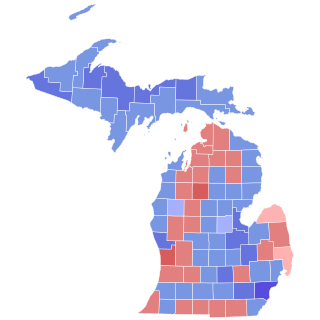
The 2006 Michigan gubernatorial election was one of the 36 U.S. gubernatorial elections held November 7, 2006. Incumbent Democratic Governor of Michigan Jennifer Granholm was re-elected with 56% of the vote over Republican businessman Dick DeVos and three minor party candidates.

The Michigan Civil Rights Initiative (MCRI), or Proposal 2, was a ballot initiative in the U.S. state of Michigan that passed into Michigan Constitutional law by a 58% to 42% margin on November 7, 2006, according to results officially certified by the Michigan Secretary of State. By Michigan law, the Proposal became law on December 22, 2006. MCRI was a citizen initiative aimed at banning consideration of race, color, sex, or religion in admission to colleges, jobs, and other publicly funded institutions – effectively prohibiting some affirmative action by public institutions based on those factors. The Proposal's constitutionality was challenged in federal court, but its constitutionality was ultimately upheld by the Supreme Court of the United States.

Elections in California are held to fill various local, state and federal seats. In California, regular elections are held every even year ; however, some seats have terms of office that are longer than two years, so not every seat is on the ballot in every election. Special elections may be held to fill vacancies at other points in time. Recall elections can also be held. Additionally, statewide initiatives, legislative referrals and referendums may be on the ballot.
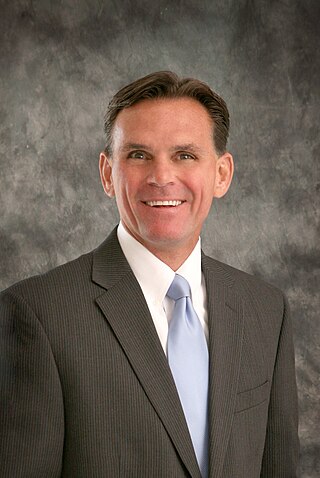
Mark Allen Hackel is an American politician serving as the County Executive of Macomb County, Michigan since the position was established in 2011. A member of the Democratic Party, Hackel previously served as the Macomb County Sheriff from 2001 to 2010.
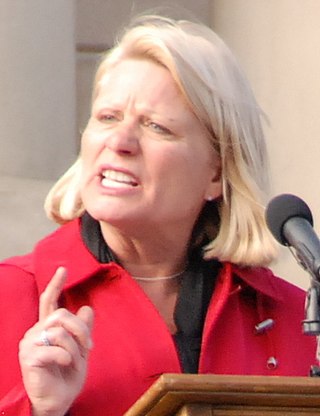
Ruth Johnson is an American businesswoman and politician currently serving as a member of the Michigan Senate since 2019. She was the 42nd Secretary of State of Michigan from 2011 to 2019 and a member of the Michigan House of Representatives from 1999 to 2005. She is a Republican.

Mark Hamilton Schauer is an American politician who served as a U.S. representative for Michigan's 7th congressional district from 2009 to 2011.

Scott Avery Boman is an American Libertarian politician from Michigan. He has consistently earned among the top votes of any third-party candidate in every Michigan election from 2000 through 2018. He was chair of the Libertarian Party of Michigan in 2006. Described by MIRS as a Libertarian Party standard-bearer, he has been a candidate in every state-wide partisan election since 1994, until successfully running for the Detroit office of Community Advisory Council in 2020.

The Virginia State Board of Elections (SBE) was created in 1946 as a nonpolitical agency responsible for ensuring uniformity, fairness, accuracy and purity in all elections in the Commonwealth of Virginia. The SBE promotes the proper administration of election laws, campaign finance disclosure compliance, and voter registration processes in the state by promulgating rules, regulations, issuing instructions, and providing information to local electoral boards and general registrars. In addition, the SBE maintains a centralized database of statewide voter registration and election related data.
James Richard Fouts is an American politician who served as the mayor of Warren, Michigan from 2007 to 2023.
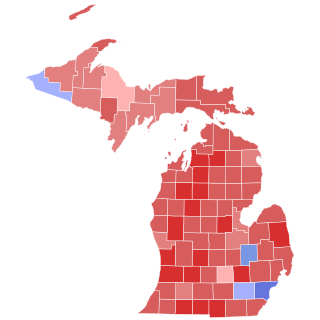
The 2010 Michigan gubernatorial election was held on November 2, 2010. Incumbent Democratic governor Jennifer Granholm and lieutenant governor John D. Cherry were prohibited by the state's Constitution from seeking a third term. This resulted in a large pool of candidates which was whittled down, when the May 11 filing deadline passed, to two Democrats and five Republicans. Both the Cook Political Report and the non-partisan Rothenberg Political Report rated the election as leaning Republican.

Michigan Proposal 08-2 was a proposal to amend the Michigan Constitution to remove restrictions on stem cell research in Michigan while maintaining the ban on human cloning. Opponents argued that it would raise taxes. The proposal was passed on November 4, 2008, by voters by a 53–47% margin.
Bogaert v. Land was a federal lawsuit filed on July 18, 2008, in the United States District Court for the Western District of Michigan by Rose Bogaert against Terri Lynn Land in Land's official capacity as Michigan Secretary of State. Bogaert claimed that her rights under the U.S. Constitution were violated by MCL 168.957, the Michigan statute that forbids recall signatures to be collected by people who live in a district other than the district of the legislator whose recall is sought. The action filed by Bogaert was a 42 U.S.C. 1983 civil rights action.
A Massachusetts general election was held on November 5, 2002 in the Commonwealth of Massachusetts.
A Massachusetts general election was held on November 8, 1994 in the Commonwealth of Massachusetts.

The 2016 United States House of Representatives elections in Michigan were held on November 8, 2016, to elect the 14 U.S. representatives from the state of Michigan, one from each of the state's 14 congressional districts. The elections coincided with the 2016 U.S. presidential election, as well as other elections to the House of Representatives, elections to the United States Senate in 33 other states and various state and local elections. The deadline for candidates to file for the August 2 primary election was April 19.

2015 Michigan Proposal 1, also known as the Michigan Sales Tax Increase for Transportation Amendment, was a referendum held on May 5, 2015, concerning a legislatively-referred ballot measure. The measure's approval would have caused one constitutional amendment and 10 statutes to go into effect. It is estimated that Proposal 1 would raise state revenues from sales and use taxes by $1.427 billion, fuel taxes by $463 million, truck registration fees by $50 million, and vehicle registration fees by $10.1 million in the first year. If approved, the proposal was estimated by the Associated Press to result in an average tax increase of $545 per household in 2016.

The Michigan Regulation and Taxation of Marihuana Act, also known as Proposal 1, was an initiative that appeared on the November 2018 ballot to legalize cannabis in the U.S. state of Michigan. The initiative allows adults 21 and older to possess up to 2.5 ounces (71 g) of cannabis and to grow up to 12 plants at home. The initiative was approved with 56% of the vote.
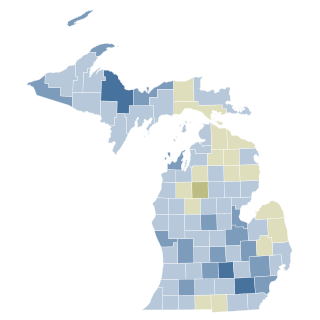
Michigan Proposal 18-2 was a ballot initiative approved by voters in Michigan as part of the 2018 United States elections. The proposal was created in preparation of the 2020 United States Census, to move control of redistricting from the state legislature to an independent commission. The commission consists of thirteen members selected randomly by the secretary of state: four affiliated with Democrats, four affiliated with Republicans, and five independents. Any Michigan voter can apply to be a commissioner, as long as they have not been, in the last six years, a politician or lobbyist. Proponents argued that Michigan's current districts are gerrymandered, giving an unfair advantage to the Republican Party. Opponents argued that the process would give the secretary of state too much power over redistricting, and that the people on the commission would be unlikely to understand principles of redistricting. The proposal was approved with 61.28% of the vote.

2018 Michigan Proposal 3 was a ballot initiative approved by voters in Michigan as part of the 2018 United States elections. The proposal, funded by the ACLU of Michigan, reformed Michigan elections by protecting the right to a secret ballot, ensuring access to ballots for military and overseas voters, adding straight-ticket voting, automatically registering voters, allowing any citizen to vote at any time, provided they have a proof of residency, allowing access to absentee ballots for any reason, and auditing election results. The proposal was overwhelmingly approved with 66.92% of the vote.

Michigan Proposal 20-1 was a ballot initiative approved by voters in Michigan as part of the 2020 United States elections. The ballot initiative amended the Michigan Constitution to require money generated from drilling of oil and gas on state-owned land to be used for upkeep of Michigan's parks and acquisition of land for recreational purposes such as hunting and fishing.
















